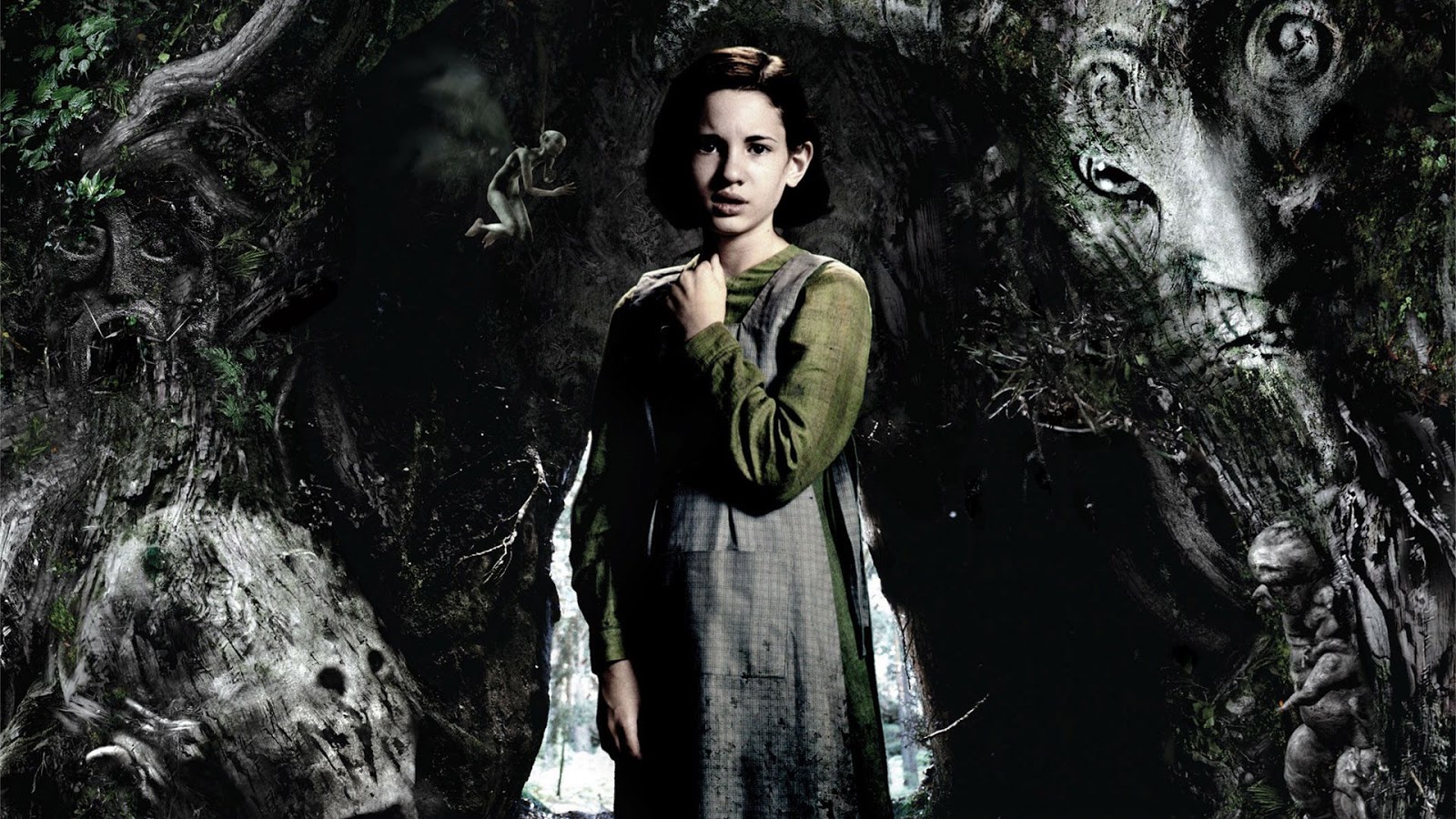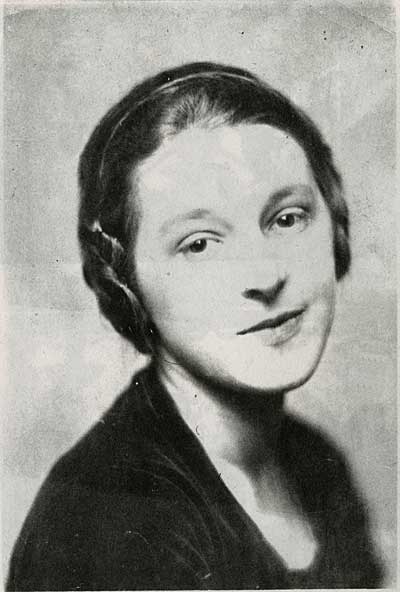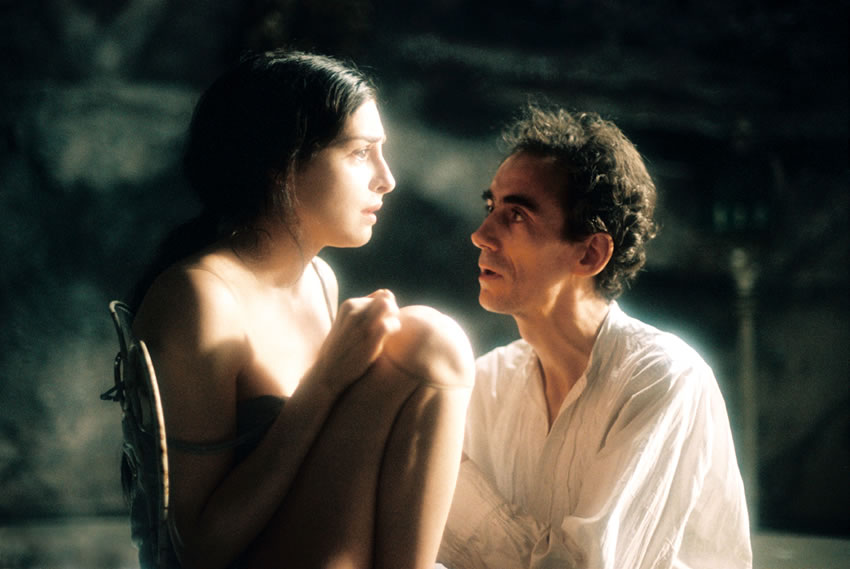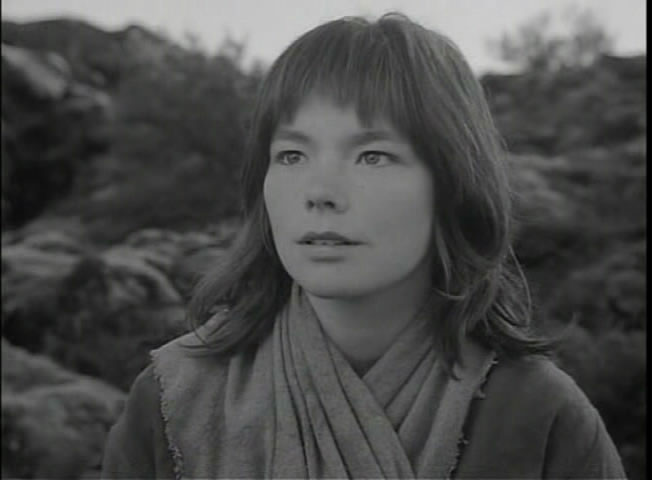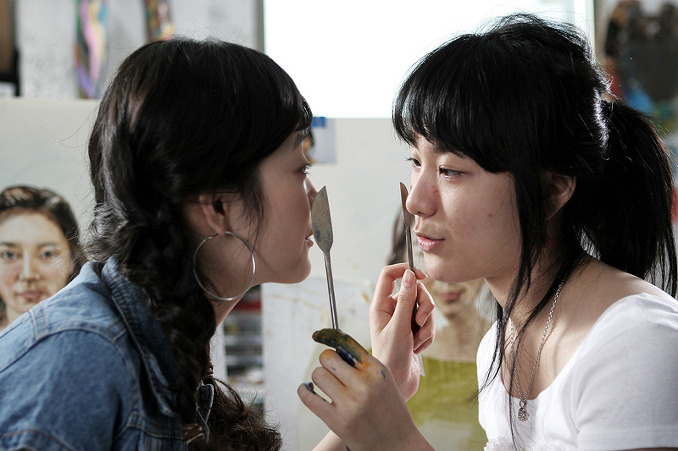2014 ACADEMY AWARDS NOMINATIONS LIST
 Friday, January 17, 2014 at 8:44AM
Friday, January 17, 2014 at 8:44AM The full list of nominees for the 86th annual Academy Awards were announced at the Samuel Goldwyn Theatre in Los Angeles overnight by actor Chris Hemsworth and Academy President Chryl Boone (pictured, below). And click here for further analysis, including our take on the high-profile snubs...

BEST PICTURE:
American Hustle Charles Roven, Richard Suckle, Megan Ellison and Jonathan Gordon, Producers
Captain Phillips Scott Rudin, Dana Brunetti and Michael De Luca, Producers
Dallas Buyers Club Robbie Brenner and Rachel Winter, Producers
Gravity Alfonso Cuarón and David Heyman, Producers
Her Megan Ellison, Spike Jonze and Vincent Landay, Producers
Nebraska Albert Berger and Ron Yerxa, Producers
Philomena Gabrielle Tana, Steve Coogan and Tracey Seaward, Producers
12 Years a Slave Brad Pitt, Dede Gardner, Jeremy Kleiner, Steve McQueen and Anthony Katagas, Producers
The Wolf of Wall Street Nominees to be determined
BEST ACTOR IN A LEADING ROLE:
Christian Bale in American Hustle
Bruce Dern in Nebraska
Leonardo DiCaprio in The Wolf of Wall Street
Chiwetel Ejiofor in 12 Years a Slave
Matthew McConaughey in Dallas Buyers Club
BEST ACTRESS IN A LEADING ROLE:
Amy Adams in American Hustle
Cate Blanchett in Blue Jasmine
Sandra Bullock in Gravity
Judi Dench in Philomena
Meryl Streep in August: Osage County
BEST DIRECTOR:
American Hustle David O. Russell
Gravity Alfonso Cuarón
Nebraska Alexander Payne
12 Years a Slave Steve McQueen
The Wolf of Wall Street Martin Scorsese
BEST ACTOR IN A SUPPORTING ROLE:
Barkhad Abdi in Captain Phillips
Bradley Cooper in American Hustle
Michael Fassbender in 12 Years a Slave
Jonah Hill in The Wolf of Wall Street
Jared Leto in Dallas Buyers Club
BEST ACTRESS IN A SUPPORTING ROLE:
Sally Hawkins in Blue Jasmine
Jennifer Lawrence in American Hustle
Lupita Nyong’o in 12 Years a Slave
Julia Roberts in August: Osage County
June Squibb in Nebraska
BEST DOCUMENTARY FEATURE:
The Act of Killing Joshua Oppenheimer and Signe Byrge Sørensen
Cutie and the Boxer Zachary Heinzerling and Lydia Dean Pilcher
Dirty Wars Richard Rowley and Jeremy Scahill
The Square Jehane Noujaim and Karim Amer
20 Feet from Stardom Nominees to be determined
BEST ANIMATED FEATURE:
The Croods Chris Sanders, Kirk DeMicco and Kristine Belson
Despicable Me 2 Chris Renaud, Pierre Coffin and Chris Meledandri
Ernest & Celestine Benjamin Renner and Didier Brunner
Frozen Chris Buck, Jennifer Lee and Peter Del Vecho
The Wind Rises Hayao Miyazaki and Toshio Suzuki
BEST FOREIGN LANGUAGE FILM:
The Broken Circle Breakdown Belgium
The Great Beauty Italy
The Hunt Denmark
The Missing Picture Cambodia
Omar Palestine
BEST ACTOR IN A SUPPORTING ROLE:
Barkhad Abdi in Captain Phillips
Bradley Cooper in American Hustle
Michael Fassbender in 12 Years a Slave
Jonah Hill in The Wolf of Wall Street
Jared Leto in Dallas Buyers Club
BEST ACTRESS IN A SUPPORTING ROLE:
Sally Hawkins in Blue Jasmine
Jennifer Lawrence in American Hustle
Lupita Nyong’o in 12 Years a Slave
Julia Roberts in August: Osage County
June Squibb in Nebraska
BEST CINEMATOGRAPHY:
The Grandmaster Philippe Le Sourd
Gravity Emmanuel Lubezki
Inside Llewyn Davis Bruno Delbonnel
Nebraska Phedon Papamichael
Prisoners Roger A. Deakins
BEST COSTUME DESIGN:
American Hustle Michael Wilkinson
The Grandmaster William Chang Suk Ping
The Great Gatsby Catherine Martin
The Invisible Woman Michael O’Connor
12 Years a Slave Patricia Norris
BEST DOCUMENTARY SHORT SUBJECT:
CaveDigger Jeffrey Karoff
Facing Fear Jason Cohen
Karama Has No Walls Sara Ishaq
The Lady in Number 6: Music Saved My Life Malcolm Clarke and Nicholas Reed
Prison Terminal: The Last Days of Private Jack Hall Edgar Barens
BEST FILM EDITING:
American Hustle Jay Cassidy, Crispin Struthers and Alan Baumgarten
Captain Phillips Christopher Rouse
Dallas Buyers Club John Mac McMurphy and Martin Pensa
Gravity Alfonso Cuarón and Mark Sanger
12 Years a Slave Joe Walker
BEST MAKEUP AND HAIRSTYLING:
Dallas Buyers Club Adruitha Lee and Robin Mathews
Jackass Presents: Bad Grandpa Stephen Prouty
The Lone Ranger Joel Harlow and Gloria Pasqua-Casny
BEST MUSIC (ORIGINAL SCORE):
The Book Thief John Williams
Gravity Steven Price
Her William Butler and Owen Pallett
Philomena Alexandre Desplat
Saving Mr. Banks Thomas Newman
BEST MUSIC (ORIGINAL SONG):
Alone Yet Not Alone from Alone Yet Not Alone
Music by Bruce Broughton; Lyric by Dennis Spiegel
Happy from Despicable Me 2
Music and Lyric by Pharrell Williams
Let It Go from Frozen
Music and Lyric by Kristen Anderson-Lopez and Robert Lopez
The Moon Song from Her
Music by Karen O; Lyric by Karen O and Spike Jonze
Ordinary Love from Mandela: Long Walk to Freedom
Music by Paul Hewson, Dave Evans, Adam Clayton and Larry Mullen; Lyric by Paul Hewson
BEST PRODUCTION DESIGN:
American Hustle Production Design: Judy Becker; Set Decoration: Heather Loeffler
Gravity Production Design: Andy Nicholson; Set Decoration: Rosie Goodwin and Joanne Woollard
The Great Gatsby Production Design: Catherine Martin; Set Decoration: Beverley Dunn
Her Production Design: K.K. Barrett; Set Decoration: Gene Serdena
12 Years a Slave Production Design: Adam Stockhausen; Set Decoration: Alice Baker
BEST SHORT FILM (ANIMATED):
Feral Daniel Sousa and Dan Golden
Get a Horse! Lauren MacMullan and Dorothy McKim
Mr. Hublot Laurent Witz and Alexandre Espigares
Possessions Shuhei Morita
Room on the Broom Max Lang and Jan Lachauer
BEST SHORT FILM (LIVE ACTION):
Aquel No Era Yo (That Wasn’t Me) Esteban Crespo
Avant Que De Tout Perdre (Just before Losing Everything) Xavier Legrand and Alexandre Gavras
Helium Anders Walter and Kim Magnusson
Pitääkö Mun Kaikki Hoitaa? (Do I Have to Take Care of Everything?) Selma Vilhunen and Kirsikka Saari
The Voorman Problem Mark Gill and Baldwin Li
BEST SOUND EDITING:
All Is Lost Steve Boeddeker and Richard Hymns
Captain Phillips Oliver Tarney
Gravity Glenn Freemantle
The Hobbit: The Desolation of Smaug Brent Burge
Lone Survivor Wylie Stateman
BEST SOUND MIXING:
Captain Phillips Chris Burdon, Mark Taylor, Mike Prestwood Smith and Chris Munro
Gravity Skip Lievsay, Niv Adiri, Christopher Benstead and Chris Munro
The Hobbit: The Desolation of Smaug Christopher Boyes, Michael Hedges, Michael Semanick and Tony Johnson
Inside Llewyn Davis Skip Lievsay, Greg Orloff and Peter F. Kurland
Lone Survivor Andy Koyama, Beau Borders and David Brownlow
BEST VISUAL EFFECTS:
Gravity Tim Webber, Chris Lawrence, Dave Shirk and Neil Corbould
The Hobbit: The Desolation of Smaug Joe Letteri, Eric Saindon, David Clayton and Eric Reynolds
Iron Man 3 Christopher Townsend, Guy Williams, Erik Nash and Dan Sudick
The Lone Ranger Tim Alexander, Gary Brozenich, Edson Williams and John Frazier
Star Trek Into Darkness Roger Guyett, Patrick Tubach, Ben Grossmann and Burt Dalton
BEST SCREENPLAY (ADAPTED):
Before Midnight Written by Richard Linklater, Julie Delpy, Ethan Hawke
Captain Phillips Screenplay by Billy Ray
Philomena Screenplay by Steve Coogan and Jeff Pope
12 Years a Slave Screenplay by John Ridley
The Wolf of Wall Street Screenplay by Terence Winter
BEST SCREENPLAY (ORIGINAL):
American Hustle Written by Eric Warren Singer and David O. Russell
Blue Jasmine Written by Woody Allen
Dallas Buyers Club Written by Craig Borten & Melisa Wallack
Her Written by Spike Jonze
Nebraska Written by Bob Nelson



